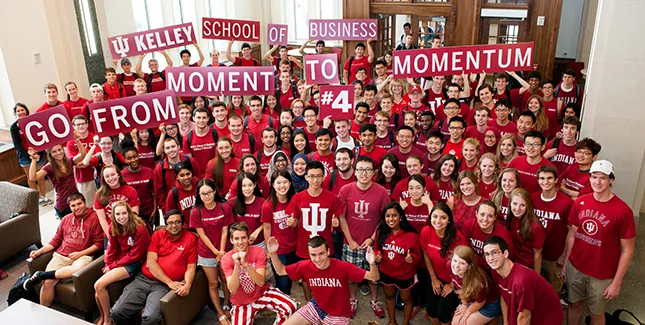
Indiana University’s Kelley School of Business students. Courtesy photo
Ask any college admissions counselor or administrator what’s the best way to find out if a school is right for you and they will all most likely give this tidbit of advice: talk to recent alums or current students. To help bring to light pertinent information at many of the country’s top business schools, we survey recent alums as part of our Best Undergraduate Business Schools ranking. This year, we polled the Class of 2017 (graduates between July 1, 2016 and June 30, 2017) at 83 of the country’s top business schools. We asked 44 questions, including 17 on a one-to-ten scale. Alumni were surveyed between August and November. (See: How We Crunched the Numbers)
As part of the ranking, we average responses to all 17 questions for each school and rank them with 10 being the highest possible score and zero being the lowest. Out of the nearly dozen data points we use in the ranking, not one is weighted more than the average of these 17 questions. While we polled 96 schools, only 83 this year met the minimum 10% response rate. That number is a drop from 88 total schools that met the minimum response rate the year before. In all, over 49,000 Class of 2017 alums were sent the survey and just under 6,000 completed the survey.
This year, we had a new school top the overall average. Bucknell University, which was participating in the ranking for the first time ever topped this year’s list with an overall average of 9.38. Bucknell finished just barely ahead of last year’s leading school, the University of Notre Dame Mendoza College of Business, which recorded an overall average of 9.36. Following Notre Dame was Georgetown University’s McDonough School of Business with a 9.27 average. Rounding out the top five were Indiana University’s Kelley School of Business (9.25) and the University of Virginia’s McIntire School of Commerce (9.23). Hult International Business School also recorded a 9.23, but when you go out beyond the second digit past the decimal, McIntire’s score is higher than Hult.
SCORES LOWER THAN LAST YEAR BUT STILL GENERALLY HIGH
At the top of the list, scores were generally down this year. Last year, Notre Dame’s Mendoza College scored a 9.53 overall. The College of William & Mary notched a 9.49 average. And Boston College’s Carroll School of Management (9.39) and Virginia McIntire (9.38) both tied or finished higher than this year’s leading school. Across all schools, the overall average was 8.54. This year, however, some 20 schools averaged at least a 9.0. That’s one school higher than the previous two years when 19 schools scored at least a 9.0. On the other hand, 13 schools averaged less than 8.0, which is a significant jump from six scoring less than 8.0 last year. And the lowest score this year of 6.95 was a bit lower than last year’s lowest average of 7.23. While the scores seem to be a bit lower this year compared to last year, they’re still relatively high considering what they could be. An overall satisfaction rate of 8.54 across nearly 6,000 respondents from 83 different schools is solid. The upshot: two years after graduation, business grads are generally very pleased with their experience.
Of course, schools are rated differently based on the prompts. Some schools have more satisfied alums in different areas than others. For example, when asked, “Do you believe your business degree was worth its cost in tuition,” no other school scored higher than The College of New Jersey, which scored 9.59. Not surprisingly, large public schools generally dominated the top of the list. The University of North Carolina at Chapel Hill’s Kenan-Flagler Business School followed with 9.48. Indiana’s Kelley School (9.43), Virginia’s McIntire (9.42), and the University of Wisconson School of Business (9.39) rounded out the top five. The only two private schools to make the top-10 were the University of Pennsylvania’s Wharton School and Georgetown McDonough.
When asked how alums would rate the quality of teaching in business courses, no school scored higher than Boston College’s Carroll School, which scored 9.46. Wake Forest University’s School of Business followed with 9.45 and both Notre Dame and Bucknell scored 9.44. Asked how well extra-curricular activities helped nourish and grow business schools, Cornell University’s Dyson School topped the list at 9.37. Wharton followed with 9.26 and North Carolina’s Kenan-Flagler followed with 9.22.
Take the time to read through the questions below and look at which schools are doing the best — and worst — at the various prompts, according to 2017 graduates.
(Click the questions below for entire lists of scores, grades, and analysis for each question.)
Would you recommend the business program to a close friend or colleague?
Evaluate how well the business program prepared you for the world of work.
Do you believe your business degree was worth its cost in tuition?
Do you believe your business degree was worth its cost in time and resources?
How would you rate the quality of teaching in business courses?
Were business school faculty available for mentoring and non-academic topics outside of class?
How would you appraise the effectiveness of the business program’s academic advising?
How would you appraise the effectiveness of the business program’s career advising?
How accessible and willing were the school’s alumni in helping you connect with potential employers?
Was your business school experience life-changing?
Do you believe your business degree will assist you in climbing to a new socioeconomic status?
How instrumental do you believe your business degree will be in reaching your dream career?











Questions about this article? Email us or leave a comment below.